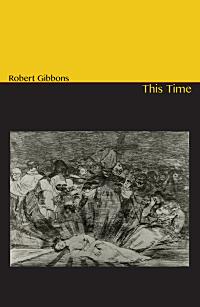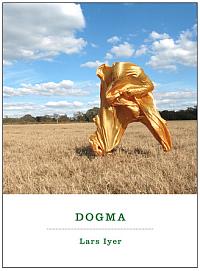|

Kerouac Sleeping
Robert Frank
1958
_______________________
Robert Gibbons: Mercy On
lumpy pudding
In one sense I just want to jot this down (it is pleasurable to begin to write most anything at this stage in life: postcard, email, journal entry, marginal note) along with others taken in preparation for the talk in Denmark, Kerouac & the Ecstatic Act of Writing. (I mean one such bit of research late last night before hitting the sack brought in D. H. Lawrence saying the Soul needs stand on the ground “among the potsherds.”) So these two dreams, one after another seem relevant. ...(more)
_______________________
Theses on Monsters
China Miéville
conjunctions
1.
The history of all hitherto-existing societies is the history of monsters. Homo sapiens is a bringer-forth of monsters as reason’s dream. They are not pathologies but symptoms, diagnoses, glories, games, and terrors.
(....)
6.
Epochs throw up the monsters they need. History can be written of monsters, and in them. We experience the conjunctions of certain werewolves and crisis-gnawed feudalism, of Cthulhu and rupturing modernity, of Frankenstein’s and Moreau’s made things and a variably troubled Enlightenment, of vampires and tediously everything, of zombies and mummies and aliens and golems/robots/clockwork constructs and their own anxieties. We pass also through the endless shifts of such monstrous germs and antigens into new wounds. All our moments are monstrous moments.
(....)
10.
When those same powers who enmonster their scapegoats reach a tipping point, a critical mass, of political ire, they abruptly and with bullying swagger enmonster themselves. The shock troops of reaction embrace their own supposed monstrousness. (From this investment emerged, for example, the Nazi Werwolf program.) Such are by far more dreadful than any monster because, their own aggrandizements notwithstanding, they are not monsters. They are more banal and more evil.
...(more)
_______________________

Robert Frank
b. November 9, 1924
in his house in Nova Scotia, 1969-1971
photograph by Walker Evans
_______________________
Spare a thought for philosophy: An interview with A.C. Grayling
(....)
What makes Grayling tick is “the fact that the world is so rich in interest and in puzzles, and that the task of finding out as much as we can about it is not an endless task but certainly one which is going to take us many, many millennia to complete”. There’s a sort of childlike grin that beams out at me, as he affirms that “that’s exciting – discovery is exciting”. Grayling joys in doubt and possibility, in invention and innovation: the tasks of the open mind and open inquiry. It’s a mindset, he reveals, that “loves the open-endedness and the continuing character of the conversation that mankind has with itself about all these things that really matter”.
It is this that marks the line in the sand between religion and science. The temptation to fall for the former hook, line and sinker is plain to see: “People like narratives, they like to have an explanation, they like to know where they are going”. Weaving another string of thought into his tapestry of human psychology, Grayling laments that his fellow beings “don’t want to have to think these things out for themselves. They like the nice, pre-packaged answer that’s just handed to them by somebody authoritative with a big beard”. He looks down towards a small flower arrangement on the table, and plays with it contemplatively before continuing in an almost plaintive tone: “And that is a kind of betrayal, in a way, of the fact that we have curiosity but, most of all, we have intelligence and so we should be questioning, challenging, trying to find out”....(more)
_______________________
Marjorie Perloff: A celebration
jacket2
Ways of reading: Marjorie Perloff and the sublimity of pragmatic criticism
Charles Bernstein
For well over three decades, Marjorie Perloff has been one of the most engaging and engaged poetry critics in America. Her commentaries on individual poets, modernist and contemporary, as well on key poetry movements and directions, have become the go-to source for interested readers, students, and scholars. And these essays are among the best introductions to the poets about whom she writes. Whether you agree with her or not, Perloff has frequently defined the terms of the discussion; and indeed, disagreeing with Perloff can be as productive as agreeing with her, which is, for me, a clear measure of the success of her work....(more)
_______________________

Robert Frank
_______________________
American Hybrid
1.
The mind, however weakened. States, foreclosure. Hurray, but for a single angle. Treasured.
Meant, to disturb. Thin balcony, stretch. To sound out, thinking. Misty. If I, prevented. A great road, flats. It parcels. Beauty, as far out as a generation.
Radius, the highlands. What famous, cut.
Morning, unread. Some nights examined. Removed, forlorn. An island, crestfallen region.
Why is it, look. I dream. I paint a picture.
As if, writing. Sleek, and dark. Appending crystals. This dull, muddied stare.
...(more)
On Barcelona
rob mclennan
_______________________
America: A Prophecy
Fragments of a dead empire. Essays, poems, one-man pickets.
Kirill Medvedev
Translated by Keith Gessen.
excerpts from It's No Good, a collection of Kirill Medvedev's poems and essays to be published this fall by n+1 and Ugly Duckling Presse.
triple canopy
Tortured by the Dialectic
Tortured by the dialectic
between activism and desire,
we left the camp and, wandering the streets,
eventually ended up in a courtyard with a minizoo
(pigeons, a pavilion, raccoons)
and then under an enormous tree
upon which looked out one lone lighted window,
and then on a small soccer field
squeezed between two buildings.
“Where should we do it?” Anna asked. “In the center of a field, amid some gates,
or, maybe, on the left flank?”
After a while the early morning smells
of blooming flowers, tart leaves,
and all the rest
dragged us further,
the alleyways, arches, courtyards all said love one another,
but didn’t let us love one another
because everywhere were cameras, fences, locks, codes,
and it soon became clear
that the soccer field would have been
a perfect place for love, like all the other
vanishing spaces in this city
the open courtyards lots and wastelands
that are so enticing because all the
secluded spots
were long ago blocked off, and are now guarded,
threaded with cameras,
sifted by gazes,
the owners, or a guard,
could come rushing out from around any corner,
it’s only in the open spaces
that you’re safe—
you’ll have ten seconds
to think about defending yourself
or prepare for death
if the forces are unequal.
Returning to the camp,
we found that it had been
destroyed,
a few, the ones who’d resisted the most, had been killed,
some of their heads had been cut off,
like cabbages on some hellish bed
the heads of our comrades
lay there and stared at us.
Ghouls in black suits
strolled around them.
These ones did not experience a contradiction between the personal and the political. ...(more)
_______________________

Robert Frank
_______________________
Translation as facticity
Erķn Moure
jacket2
What does Prague and a notebook I bought on The Danforth in Toronto (a reject)—and have no right to use—have to do with translation, you ask? Perhaps all translation has to do with curiosity and melancholy, I respond.

Joaquin Torres-Garcia
d. 8 August 1949
_______________________
Rebecca Solnit interview
Bombsite
discussing her latest offering, A Paradise Built in Hell: The Extraordinary Communities That Arise in Disaster
(....)
AT
One of the most interesting ideas in the book is the concept of “elite panic”—the way that elites, during disasters and their aftermath, imagine that the public is not only in danger but also a source of danger. You show in case after case how elites respond in destructive ways, from withholding essential information, to blocking citizen relief efforts, to protecting property instead of people. As you write in the book, “there are grounds for fear of a coherent insurgent public, not just an overwrought, savage one.”
RS
The term “elite panic” was coined by Caron Chess and Lee Clarke of Rutgers. From the beginning of the field in the 1950s to the present, the major sociologists of disaster—Charles Fritz, Enrico Quarantelli, Kathleen Tierney, and Lee Clarke—proceeding in the most cautious, methodical, and clearly attempting-to-be-politically-neutral way of social scientists, arrived via their research at this enormous confidence in human nature and deep critique of institutional authority. It’s quite remarkable.
Elites tend to believe in a venal, selfish, and essentially monstrous version of human nature, which I sometimes think is their own human nature. I mean, people don’t become incredibly wealthy and powerful by being angelic, necessarily. They believe that only their power keeps the rest of us in line and that when it somehow shrinks away, our seething violence will rise to the surface—that was very clear in Katrina. Timothy Garton Ash and Maureen Dowd and all these other people immediately jumped on the bandwagon and started writing commentaries based on the assumption that the rumors of mass violence during Katrina were true. A lot of people have never understood that the rumors were dispelled and that those things didn’t actually happen; it’s tragic.
But there’s also an elite fear—going back to the 19th century—that there will be urban insurrection. It’s a valid fear. I see these moments of crisis as moments of popular power and positive social change. The major example in my book is Mexico City, where the ’85 earthquake prompted public disaffection with the one-party system and, therefore, the rebirth of civil society....(more)
_______________________

J. Bernlef
1937 – 2012
photo - Leo van Noort
The Museum Of Childhood
J. Bernlef
Translation: Scott Rollins
It's always somewhere, but whoever happens upon it
in some nameless street, usually runs into
a closed door behind which silence reigns
Or seems to reign. Most go on
back to the familiar layout of streets
and forget its existence.
Is the museum fluid, can it be folded
does it consist of prisms, electric fields
or just coincide with whoever thinks of it?
It's mostly deserted, the walls
and display cases empty save for dates
each debating whether the other is accurate
Or it fills with fog, with a
hesitant voice inside claiming
to remember nothing, virtually nothing.
But one single face, sound, incidence of light
can suddenly afford entrance to the
exposition where all has proven preserved.
_______________________
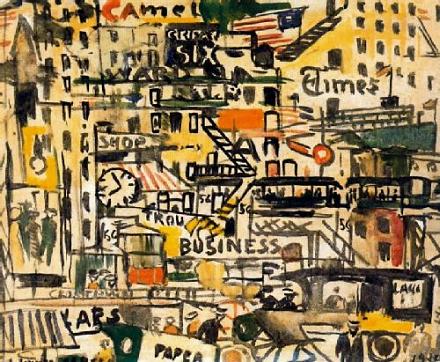
Joaquin Torres Garcia
_______________________
Saying ‘We’ Again:
A Conversation with Jodi Dean on Democracy, Occupy and Communism
critical legal thinking
(....)
The more neo-?liberalism has entrenched itself the more we have been hearing this language of democracy, as if participation was going to solve all problems?—?but this is a fantasy because the fundamental truth is that it is not going to solve these problems. Keeping all the activity in the democratic sphere makes it seem as if people are busy, engaged etc. without ever affecting the basic structure. It’s a fantasy because it functions like a screen.
...(more)
_______________________
Murray Bookchin:
(1921-2006)
The Man Who Brought Radical Ecology and Assembly Democracy to the Left
Janet Biehl
Why Recover Bookchin?
interview with Andy Price
author of Recovering Bookchin
_______________________
An honest candidacy
Ray Davis
Mitt Romney's every utterance was either lying or deluded. Yet in a sense he was the least deceitful presidential nominee of my lifetime: he truly represented his party's interests. No fake folksiness; no fake patriotism; no fake rage or compassion or erudition. Romney is a selfish, smug, willfully ignorant, well-maintained son of wealth who's devoted his life to pure consumption. He's the post-1980 equivalent of a fat guy in waistcoat, monocle, and top hat. For once, the captain played the figurehead and the face played the mask.
And so gullibility can't be what's the matter with Kansas (60%), Alabama (61%), Idaho (65%), Oklahoma (67%), or Wyoming (69%). At least fifty-seven million American voters genuinely admire plutocrats more than teachers, scholars, doctors, nurses, lawyers, or civil servants. They don't have to be tricked into abjection. They like it.
.
_______________________

Joaquin Torres-Garcia
_______________________
After The Depression
Leo van Noort
Translation: Scott Rollins
On the edge of the newspaper he sketches skelet
tries to cry but that ancient feeling
evaporates in the loud headline of the sun - instead
he makes some coffee in the bitter realization
the world wants to know nothing of his dying
He crawls out of his watch into his clothes
shaves and sees in the mirror
someone rubbing his hands together
ready to strike, to intervene
in constellations and charts.

photo - mw
_______________________
Notebook (A. R. Ammons, Frank O’Hara, &c.)
John Latta
Piecemeal and ineffectual be the worldly captures, and dubious the churnings “out.” Retrieval’s zone is littered with breakage, and clarity, that low-hanging fruit, is but a roseate stand-in for doxy without gumption, a parent to appearance’s simpler sway. So the out-lying rough spurs up a slackening, and the hawsers droop in their tethering, grips go listless, fists unclench and drag useless in the abluent. Thus we “hold to / a majesty sense only manages to blemish,” rhetorically big, a little stand-offish in the flail and outreach of our roaring.
...(more)
_______________________
From “Double-Gazing Semes after Babel Sequestering” (Some Notes on Collaboration)
the opening of Pierre Joris's introduction to Synopticon: A Collaborative Poetics by Louis Armand & John Kinsella
courtesy of Jerome Rothenberg
(....)
Two modes for the single author to work through this & toward a sort of collaboration have stuck in mind. Many years ago Allen Ginsberg instructed me on the need to “write through” others, loved ones, admired ones, departed ones — as he had done writing through Kerouac & Burroughs, & others. Collaboration in absentia, you could say, though Ginsberg had called it “writing through someone’s mind.” Closer to my own sense of poetry, I have been intrigued & awed by the writing through of texts (rather than minds, though who is to say they are different?), with Robert Kelly’s (writing through Shelley's) Mont Blanc my favorite achievement in this practice. And yet, in our context, is this true collaboration? Such practice does propose a “co,” is clearly “labor” intensive, & constitutes an “oration” of sorts, a discourse, certainly, & one that often plays the voice of the text against/with the voice of the one who intervenes.
And yet, & yet — all this doesn’t exactly speak to the act of collaboration under hand, Armand & Kinsella’s Synopticon. Could I make this introduction a collaboration via quotation, insertion, transcription? Loan words? What fascinated me in Synopticon right away were the techniques used to cut through matters of space & time. As the authors’ note tells us, it took ten years to create this sequence of texts via email. This time-frame alone makes one aware that collaboration — at least in this case — can also involve slow processes of empty time (rhyming with John Cage’s “empty words?”), spaces of forgetfulness, willful or otherwise, calls & recalls, sudden moments of intense exchanges, or, to use the authors’ words “numerous promptings & erasures, sorties, advances, feints.” Note a strangely military or at least sporting terminology, two gentlemen by a river in early morning light, fencing, dueling? Ah! Could this be where some of my misgivings came from? Some fear that collaboration could at moments become or at least feel like an act of violence? But then, doesn’t all writing that takes itself & its relation to language seriously imply such an act of violence, of wrestling with some angel or other, if it wants to “make it new?” Or am I just indulging in some old-fashioned musings, some romanticisms of egoic/heroic compositional prejudices?...(more)
_______________________

Jacques Dupin
1927 - 2012
High Wind
We only belong to the mountain path
meandering under the sun between sage and lichen
rising at night, a borderline path
towards contellations,
we have enabled tops to come close to each other
the limit of arable lands
seeds burst in our fists
flames into our bones
Let manure rise all the way to us on men's backs
Let vine and rye answer
to the volcano's old age
the fruits of pride, the fruits of basalt
will ripe under the blows
that make us visible
Flesh will endure what the eye suffered from
what wolves never dreamt
before flowing on to the sea.
_______________________
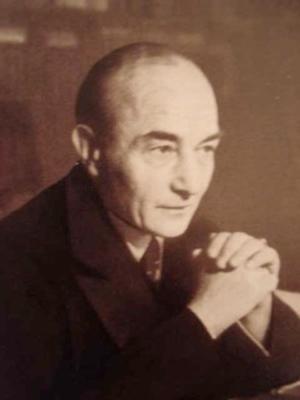
Robert Musil
b. November 6, 1880
If someone were to discover, for instance, that under hitherto unobserved circumstances stones were able to speak, it would take only a few pages to describe and explain so earth-shattering a phenomenon. On the other hand, one can always write yet another book about positive thinking, and this is far from being of only academic interest, since it involves a method that makes it impossible ever to arrive at a clear resolution of life's most important questions. Human activities might be graded by the quantity of words required: the more words, the worse their character. All the knowledge that has led our species from wearing animal skins to people flying, complete with proofs, would fill a handful of reference books, but a bookcase the size of the earth would not suffice to hold all the rest, quite apart from the vast discussions that are conducted not with the pen but with the sword and chains. The thought suggests itself that we carry on our human business in a most irrational manner when we do not use those methods by which the exact sciences have forged ahead in such exemplary fashion.(....)
It would be a useful experiment to try to cut down to the minimum the moral expenditure (of whatever kind) that accompanies all our actions, to satisfy ourselves with being moral only in those exceptional cases where it really counts, but otherwise not to think differently from the way we do about standardizing pencils or screws. Perhaps not much good would be done that way, but some things would be done better; there would be no talent left, only genius; the washed-out prints that develop from the pallid resemblance of actions to virtues would disappear from the image of life; in their place we would have these virtues' intoxicating fusion in holiness. In short, from every ton of morality a milligram of an essence would be left over, a millionth part of which is enough to yield an enchanting joy.
Excerpts [pdf] from Robert Musil, The Man Without Qualities
translated by Sophie Wilkins and Burton Pike
Precision and Soul: Essays and Addresses
Robert Musil google books
Posthumous Papers of a Living Author Robert Musil google books
_______________________

photo - mw
_______________________
Two Poems:
Flammigčre
&
The line the loss [pdf]
Anne-Marie Albiach
(1937-2012)
translated from the French by Peter Riley
(....)
into cremation of the powers
the humble enslaved return
to the land
seduction: roots veins coaxed
to reintegrate the matrix
withdrawal to prism
enclosure of a catacomb
busy with wings
Heat of the illusion
into the tenderness of the muscles and of the gait
to raise the anchors
to stiffen the dreams
amputations
aspiration their wounds
towards the uniform sectioning of time
game, nbsp;
cutting edge
where the present is flayed
and our wound with it
(....) _______________________
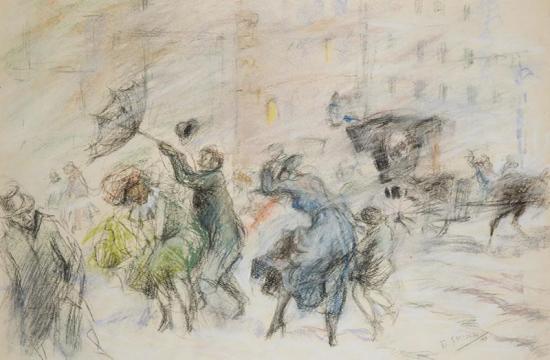
Windy Day
Everett Shinn
b. November 6, 1876
_______________________
At Play in the Cyber/Fields of Cultural Production, or:
How to Be a Stay-at-Home Mom and Earn Extra Symbolic Capital in your Spare Time
John Freeman
ctheory

Chicago
Ray K. Metzker
1959 1 2 3
_______________________
The Dance
C.K. Williams
A middle-aged woman, quite plain, to be polite about it, and
somewhat stout, to be more courteous still,
but when she and the rather good-looking, much younger man
she's with get up to dance,
her forearm descends with such delicate lightness, such restrained
but confident ardor athwart his shoulder,
drawing him to her with such a firm, compelling warmth, and
moving him with effortless grace
into the union she's instantly established with the not at all
rhythmically solid music in this second-rate cafe,
that something in the rest of us, some doubt about ourselves, some
sad conjecture, seems to be allayed,
nothing that we'd ever thought of as a real lack, nothing not to be
admired or be repentant for,
but something to which we've never adequately given credence,
which might have consoling implications about how we
misbelieve ourselves, and so the world,
that world beyond us which so often disappoints, but which
sometimes shows us, lovely, what we are.
C. K. Williams at PennSound
_______________________
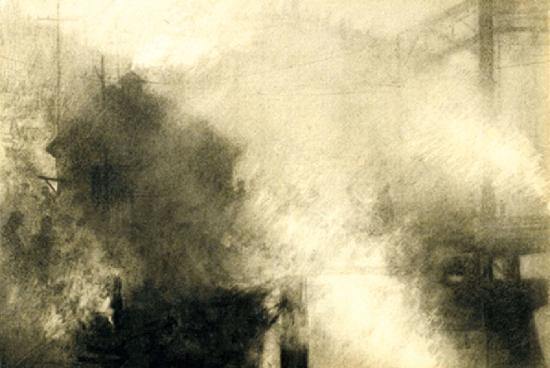
Morning Mist at the Mine Mouth
1908
Joseph Stell
d. November 5, 1946
_______________________
For Buddhists and ecologists alike, we are all created from spare parts scavenged from the same cosmic junk-heap
Only connect David P Barash Aeon Magazine
(....)
However, for me, as a scientist, there is something much more in the Buddhist tradition than an injunction to care for other living things. This meeting of the minds, Buddhist and ecological, results from similar insights into the nature of reality itself — which is indistinguishable from the reality of nature — and of our place in the whole business.
‘If you are a poet,’ writes the contemporary Zen master Thich Nhat Hanh, ‘you will see that there is a cloud in this sheet of paper. Without a cloud, there will be no rain; without rain, the trees cannot grow; and without trees, we cannot make paper.’ He goes on to include the logger who cut the trees, the logger's mother, and so forth. If you, too, can see the cloud in a sheet of paper, then perhaps you too are a poet, a Zen master — or an ecologist. Regardless of who sees it, there really is a cloud in a sheet of paper, as well as a bark beetle, a handful of soil, a bit of bird poop, even the gasoline that powered the logger’s chain saw. It is similarly possible that if you were to chronicle the history of those atoms that constitute the electronic screen from which you are now reading, you would find that they were once part of Peter the Great, a woolly mammoth, or (and!) a Komodo dragon.
The interconnected and interdependent nature of things is the heart of ecology. It is also remarkably similar to the fundamental insight of Buddhism: ‘dependent co-arising’ or pratityasamutpada in Sanskrit; paticcasamuppada in Pali. Traditional Tibetan Buddhists repeat, over and over, that all things have at some time been our mothers, just as we have at some time been theirs. In both the Theravada and Mahayana schools of Buddhism, the key teaching is ‘compassion’, which means something quite different from empathy, sympathy, doing good, being nice, or easy phrases about ‘feeling your pain’....(more)
_______________________

Pictus Interruptus
Ray K. Metzker
_______________________
The S&M Election
Chris Hedges
I learned at the age of 10, when I was shipped off to a New England boarding school where the hazing of younger boys was the principal form of recreation, that those who hunger for power are psychopathic bastards.
(....)
Obama tells us that we better lick his boots or we will face the brute down the hall, Mitt Romney. After all, we wouldn’t want the bad people to get their hands on these newly minted mechanisms of repression. We will, if we do not behave, end up with a more advanced security and surveillance state, the completion of the XL Keystone pipeline, unchecked pillage from Wall Street, environmental catastrophe and even worse health care. Yet we know on some level that once the election is over, Obama will, if he is re-elected, again betray us. This is part of the game. We dutifully assume our position. We cry out in holy terror. We promise to obey. And we are mocked as we watch promises crumble into dust....(more)
_______________________
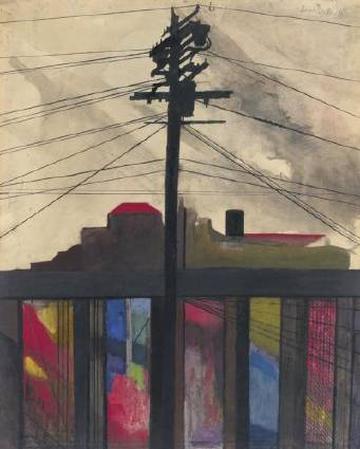
Telegraph Pole
Joseph Stella
_______________________
the lie is brief and sweet
the truth is forever and hard
in dry prong louisiana on march 7 2011
the lie can last a long time says laura
you mean like religion
that and other things like that
prisons hospitals churches
simultaneous afterthoughts
only trees seem to be trees
whose inmates didn't build them
Andrei Codrescu: driving, from So Recently Rent a World, 2012
via Tom Clark
_______________________

Philadelphia
Ray K. Metzker
1963
_______________________
The History of Men
Jack Gilbert
It thrashes in the oaks and soughs in the elms.
Catches on innocence and soon dismantles that.
Sends children bewildered into life. Childhood
ends and is not buried. The young men ride out
and fall off, the horses wandering away. They get
on boats, are carried downstream, discover maidens.
They marry them without meaning to, meaning no harm,
the language beyond them. So everything ends.
Divorce gets them nowhere. They drift away from
the ruined women without noticing. See birds
high up and follow."Out of earshot," they think,
puzzled by earshot. History driving them forward,
making a noise like the wind in maples, of women
in their dresses. It stings their hearts finally.
It wakes them up, baffled in the middle of their lives
on a small bare island, the sea blue and empty,
the days stretching all the way to the horizon.
Jack Gilbert interview
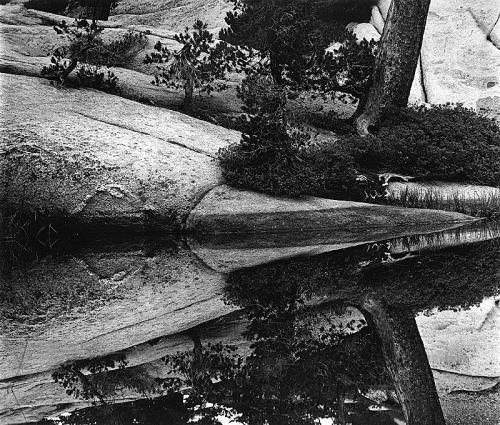
Pond and Rocks, High Sierra
1973
Brett Weston
1911 - 1993
_______________________
Against Complicity
The Moral Case for Silence
Norman Pollack
bomb
Herman Melville’s story, “Bartleby, the Scrivener,” written 160-odd years ago, is now more relevant than ever. Bartleby faces out to a blank wall–the subtitle is, “A Story of Wall Street”–his highest assertion of self being:”I prefer not to.” Melville, perhaps America’s greatest writer, was making an important statement: meaningful choice has been circumscribed, even by the mid-19th century, in American society. Not only was the heroic turned against itself, but a pervasive condition of alienation defined the individual’s inner life and relations to others. One encountered reality through basic compromises of the ideal vision of a democratic polity, so that engagement became complicity in the renewal of one’s alienation. This, Melville resolutely opposed.
So, too, did Sherwood Anderson seventy years later. (By coincidence, today the New York Times focuses on Elyria, Ohio, his birthplace and the locale for Winesburg, which remains essentially unchanged.) Anderson also captures the loneliness and sadness of American life, which finds the individual enclosed within walls, so that one’s highest affirmation becomes to say “No” to the materialism that trades in false values and destroys the human soul. From Melville to Anderson to the present, America is still in the same condition, only now in more intensified form in that we no longer recognize alienation and willingly accept complicity in a life devoid of self-knowledge and the cooperative social bonds which alone confers dignity on human beings.
Making the moral case for silence as imperative in the coming election may seem difficult. ...(more)
_______________________
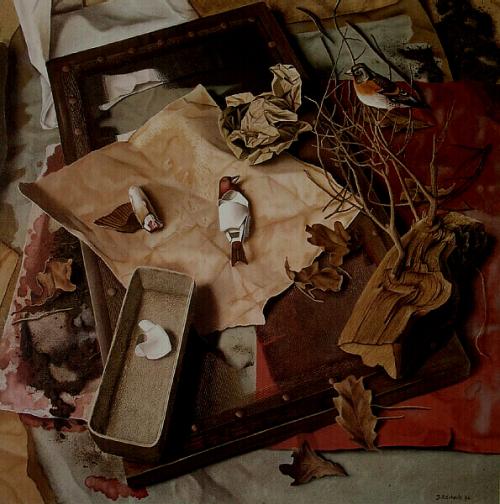
'Still life with brambling'
Dick Ket
In the shadow of tomorrow.
Neorealism in the Netherlands
_______________________
The dead speak kindly
Tua Forsström
Translated by David McDuff
books from Finland
(....)
The thing with sorrow is that one thought there
was a fire but it is starting to rain. The brushwood smokes
listlessly for a while, it is far too sparse or dense
and on the field remains a dark installation sprawling
to the sky. The smoke from the clear evenings in April has
stuck in the jacket in the hall. Far from the city’s lights
So many years have passed, but flakes detach at the slightest breath
and blow out across the lake and up toward the house where I lived
with my parents and my brother, in our family.
The next chapter is called: before we forget
The next chapter is called: the darkness
the rain the kindness
It is already October and blowing hard
I must drive firewood home
I must turn the key in the lock
And then I hear again that voice,
mysterious and clear
You are old now little child
don’t be afraid little hare
...(more)
Introduction by Michel Ekman
_______________________
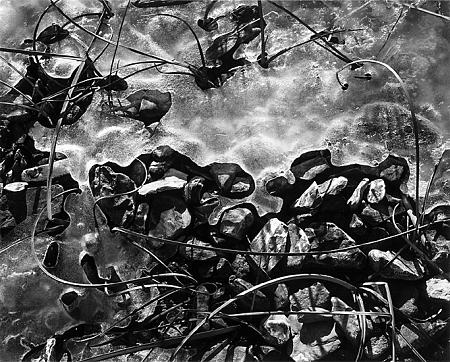
Ice, Rocks and Reeds
1954
Brett Weston
Steven Kasher Gallery
via
_______________________
Otoliths twenty-seven
from Symphony No.8
(13.7 billion years)
Ric Carfagna
-31-
At some point
a world is
remembered
from archetypal structures
disassociated from thought
where doorways enter
to intersect
an unconscious reality
fleshed out
in shadows of statuary dust
“it is here we thought of birth”
where glandular geometries
fill an eye’s annular cavity
ameliorating the view
from a womb’s delimiting cage
where an implicate order
is assumed
amid a debris field’s terrestrial expanse
yet it is
unreasonable to think this
dream defines (a) reality
observing the untenable flow
of an ocean’s edge
or the stain which remains
an imposing blackness
on the otherwise
unblemished page
“it is here we thought of death”
bearing the weight
of ages frozen
in the cadaver’s desiccated veins
or a vision of crows
invading a culled orchid field
as the spherical burrs
of a winter descend
...(more)
_______________________
Banned Chinese Writers
Words without Borders November 2012
_______________________
Joyce Carol Oates tweets
Tweets are the flitting shadows of actual life unglimpsed in actual life.
A tweet is a synaptic leap with no neuron awaiting.
_______________________
Lewis Lapham’s Antidote to the Age of BuzzFeed
Ron Rosenbaum
Smithsonian
(....)
Lapham, the legendary former editor of Harper’s, who, beginning in the 1970s, helped change the face of American nonfiction, has a new mission: taking on the Great Paradox of the digital age. Suddenly thanks to Google Books, JSTOR and the like, all the great thinkers of all the civilizations past and present are one or two clicks away. The great library of Alexandria, nexus of all the learning of the ancient world that burned to the ground, has risen from the ashes online. And yet—here is the paradox—the wisdom of the ages is in some ways more distant and difficult to find than ever, buried like lost treasure beneath a fathomless ocean of online ignorance and trivia that makes what is worthy and timeless more inaccessible than ever. There has been no great librarian of Alexandria, no accessible finder’s guide, until Lapham created his quarterly five years ago with the quixotic mission of serving as a highly selective search engine for the wisdom of the past.
Which is why the spartan quarters of the Quarterly remind me of the role rare and scattered monasteries of the Dark Ages played when, as the plague raged and the scarce manuscripts of classical literature were being burned, dedicated monks made it their sacred mission to preserve, copy, illuminate manuscripts that otherwise might have been lost forever.
...(more)
Lapham’s Quarterly
|

